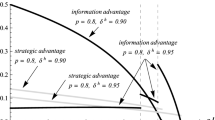Abstract
Bargainers must generally attempt to judge their counterparts' preferences, beliefs, and alternatives to settlement. Both descriptive and prescriptive theorists have assumed that an accurate perception of the other bargainer's reservation price (r.p.) is advantageous. Yet, unbiased judgments are optimal only when the costs of underestimation and overestimation are symmetric. Optimistic bias has been found to have adaptive value in judgments related to other types of tasks. In two studies we examined the relationship between perceptions of the bargaining zone and settlements in essentially distributive bargaining games. In the largely exploratory study one, bargainers were generally optimistically biased (i.e., they thought their counterpart could concede more than s/he really could) and optimism was positively correlated with profitability. In study 2 we manipulated information to induce accurate or biased perceptions. Optimistically biased negotiators again reached more profitable settlements than accurate or pessimistically biased negotiators. Optimism did not increase the likelihood of impasse in either study. Nor did it damage the relationship between the parties. Initial optimism appears to play an adaptive role in bargaining.
Similar content being viewed by others
References
Alpert, M. and H. Raiffa. (1982). “A progress report on the training of probability assessors”, in D. Kahneman, P. Slovic, and A. Tversky. (eds.), Judgment under uncertainty: Heuristics and biases. Cambridge: Cambridge University Press.
Bazerman, M.H. and M.A. Neale. (1992). Negotiating rationally. New York: Free Press.
Brodt, S.E.(1994). “Inside' information and negotiator decision behavior”, Organizational Behavior and Human Decision Processes, 58, 172–202.
Camerer, C. (1992). “The rationality of prices and volume in experimental markets,” Organizational Behavior and Human Decision Processes, 51, 237–272.
Cooter, R., S. Marks and R. Mnookin. (1982). “Bargaining in the shadow of the law: A testable model of strategic behavior”, Journal of Legal Studies 11, 225–251.
Copeland, R.M. and R.J. Marioni. (1972). “Executives' forecasts of earnings per share versus forecasts of naive models”, Journal of Business 45, 497–512.
Cyert, R.M., W.R. Dill and J.G. March. (1958). “The role of expectations in business decision making”, Administrative Science Quartery 3, 307–340.
Gould, J.P. (1973). “The economics of legal conflicts”, Journal of Legal Studies 2, 279–301.
Kahneman, D. (1992). “Reference points, anchors, norms, and mixed feelings”, Organizational Behavior and Human Decision Processes 51, 296–312
Kelley, H.H., L.L. Beckman and C.S. Fischer. (1967). “Negotiating the division of a reward under incomplete information”, Journal of Experimental and Social Psychology 3, 361–398.
Kidd, J.B. (1970). “The utilization of subjective probabilities in production planning”, Acta Psychologica 34, 338–347
Kormendi, R.C. and C.R. Plott. (1982). “Committee decisions under alternative procedural rules”, Journal of Economic Behavior and Organization 3, 175–195.
Paese, P.W. and J.A. Sniezek. (1991). “Influences on the appropriateness of confidence in judgment: Practice, effort, information, and decision making”, Organizational Behavior and Human Decision Processes 48, 100–130.
Perloff, L.S. (1983). “Perceptions of vulnerability to victimization”, Journal of Social Issues 39, 41–61.
Pruitt, D. and J.L. Drews. (1969). “The effect of time pressure, time elapsed, and the opponent's concession rate on behavior in negotiation”, Journal of Experimental Social Psychology 5, 43–60.
Raiffa, H. (1982). The art and science of negotiation. Cambridge, MA: Belknap Press.
Simon, H.A. (1979). “Rational decision making in business organizations”, American Economic Review 68, 493–513.
Slovic, P. (1966). “Value as a determiner of subjective probability”, IEEE Transactions on Human Factors in Electronics 7, 22–28.
Sperber, P. (1993). “Pre-negotiation planning for the business pro”, in R.J. Lewicki, J.A. Litterer, D.M. Saunders, & J.W. Minton (Eds.), Negotiation. Boston, MA: Irwin.
Taylor, S.E. and J.D. Brown. (1988). “Illusion and well-being: A social psychological perspective on mental health”, Psychological Bulletin 103, 193–210.
Thaler, R.(1980). “Toward a positive theory of consumer choice”, Journal of Economic Behavior and Organization 1, 39–60.
Ury, W. (1993). Getting past no. New York: Bantam Books.
Wallsten, T.S. (1981). “Physician and medical student bias in evaluating diagnostic information”, Medical Decision Making 1, 145–164.
Weber, E.U. (1994). “From subjective probabilities to decision weights: The effect of asymmetric loss functions on the evaluation of uncertain outcomes and events”, Psychological Bulletin 115, 228–242.
Weinstein, N.D. (1982). “Unrealistic optimism about future life events”, Journal of Personality and Social Psychology 39, 806–820.
Winkler, R.L and A.H. Murphy. (1968). “ 'Good' probability assessors”, Journal of Applied Meteorology 7, 751–758.
Yates, J.F. (1990). Judgment and decision making. Englewood Cliffs, NJ: Prentice Hall.




